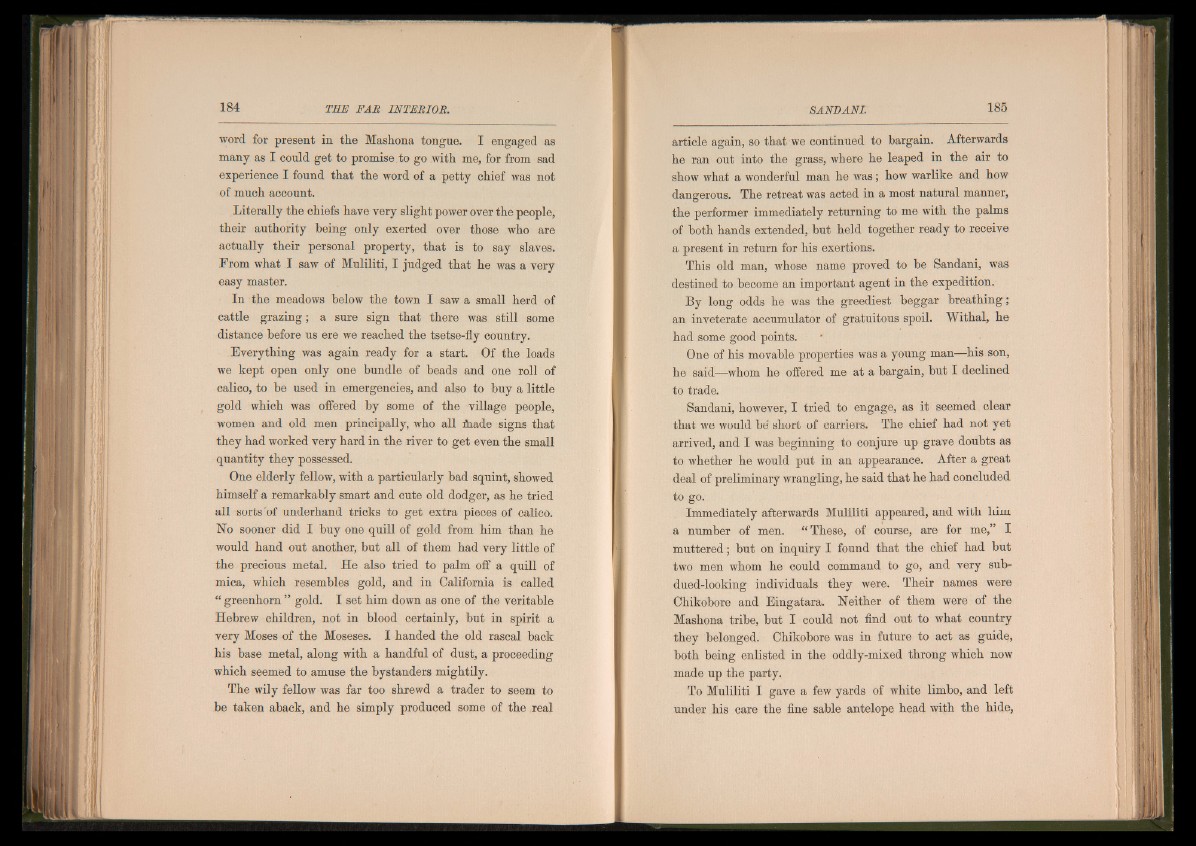
word for present in tlie Mashona tongue. I engaged as
many as I could get to promise to go with me, for from sad
experience I found that the word of a petty chief was not
of much account.
Literally the chiefs have very slight power over the people,
their authority being only exerted over those who are
actually their personal property, that is to say slaves.
From what I saw of Muliliti, I judged that he was a very
easy master.
In the meadows below the town I saw a small herd of
cattle grazing; a sure sign that there was still some
distance before us ere we reached the tsetse-fly country.
Everything was again ready for a start. Of the loads
we kept open only one bundle of beads and one roll of
calico, to be used in emergencies, and also to buy a little
gold which was offered by some of the village people,
women and old men principally, who all ihade signs that
they had worked very hard in the river to get even the small
quantity they possessed.
One elderly fellow, with a particularly bad squint, showed
himself a remarkably smart and cute old dodger, as he tried
all sorts of underhand tricks to get extra pieces of calico.
No sooner did I buy one quill of gold from him than he
would hand out another, but all of them had very little of
the precious metal. He also tried to palm off a quill of
mica, which resembles gold, and in California is called
“ greenhorn ” gold. I set him down as one of the veritable
Hebrew children, not in blood certainly, but in spirit a
very Moses of the Moseses. I handed the old rascal back
his base metal, along with a handful of dust, a proceeding
which seemed to amuse the bystanders mightily.
The wily fellow was far too shrewd a trader to seem to
be taken aback, and he simply produced some of the real
article again, so that we continued to bargain. Afterwards
he ran out into the grass, where he leaped in the air to
show what a wonderful man he was; how warlike and how
dangerous. The retreat was acted in a most natural manner,
the performer immediately returning to me with the palms
of both hands extended, but held together ready to receive
a present in return for his exertions.
This old man, whose name proved to be Sandani, was
destined to become an important agent in the expedition.
By long odds he was the greediest beggar breathing;
an inveterate accumulator of gratuitous spoil. Withal, he
had some good points.
One of his movable properties was a young man—his son,
he said-§|whom he offered me at a bargain, but I declined
to trade.
Sandani, however, I tried to engage, as it seemed clear
that we would be short of carriers. The chief had not yet
arrived, and I was beginning to conjure up grave doubts as
to whether he would put in an appearance. After a great
deal of preliminary wrangling, he said that he had concluded
to go.
Immediately afterwards Muliliti appeared, and with him
a number of men. “ These, of course, are for me,” I
muttered; but on inquiry I found that the chief had but
two men whom he could command to go, and very sub-
dued-looking individuals they were. Their names were
Chikobore and Eingatara. Neither of them were of the
Mashona tribe, but I could not find out to what country
they belonged. Chikobore was in future to act as guide,
both being enlisted in the oddly-mixed throng which now
made up the party.
To Muliliti I gave a few yards of white limbo, and left
under his care the fine sable antelope head with the hide,